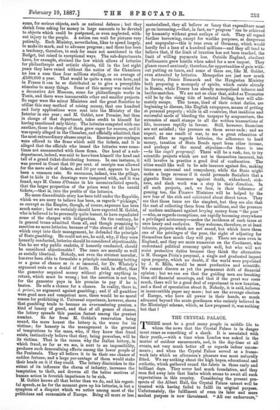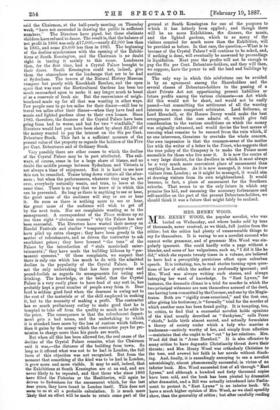THE CRYSTAL PALACE.
91HERE must be a good many people in middle life to J- whom the news that the Crystal Palace is in danger most come as something of a shock. It is associated with their youth,—with a time when London was naked in the matter of outdoor amusements, and, in the day-time at all events, not very much better off as regards indoor amuse- ments; and when the Crystal Palace served as a frame- work into which an afternoon's pleasure was most naturally fitted. We say nothing about the high hopes, educational and msthetic, which gathered round the fabric in those early and brilliant days. They never had much foundation, and they soon fled away into that limbo which seems to await all such expectations in this country. Considering the present pro- spects of the Albert Hall, the Crystal Palace cannot well be taunted with having failed to fulfil its original purpose. Unfortunately, the fulfilment of even its later and more modest purpose is now threatened. "An our endeavours,"
said the Chairman, at the half-yearly meeting on Thursday week, "have not succeeded in drawing the public in sufficient numbers." The Directors have piped, but these obstinate children have refused to dance. The result is, that the balance of *et profit in 1886 was only £17,000,—nearly £2,000 less than in 1885, and some £9;000 less than in 1883. The beginning ef the decline synchronises with the opening of the Exhibi- tions at South Kensington, and the Chairman is no doubt right in tracing it mainly to this cause. Londoners then, for the first time, had a Crystal Palace brought to their doors. South Kensington could not, indeed, give them the atmosphere or the landscape that are to be had at Sydenham. The towers of the Natural History Museum compare but poorly with Knockholt Beeches, and the open space that was once the Horticultural Gardens has been too much encroached upon to make it any longer much to boast of as a reservoir of fresh air. But the convenience of neigh- bourhood made up for all that was wanting in other ways. Few people care to go ten miles for their dinner—still less to travel ten miles after their dinner—when they have food and music and lighted gardens close to their own homes. Since 1883, therefore, the finances of the Crystal Palace have been going from bad to worse, and but for two "windfalls," the Directors would last year have been short by about £2,500 of the money wanted to pay the interest on the Six per Cent. Debenture Stock. This fact is a sufficient measure of the present value of the property as regards the holders of the Five per Cent. Debentures and of Ordinary Stock.
Very possibly there are other causes to which the decline of the Crystal Palace may be in part attributed. The rail- ways, of course, come in for a large share of blame, and no doubt the middle passage between Sydenham and Victoria is sot always a time of enjoyment. But it is hard to see how this can be remedied. Trains bring down visitors all the after- soon; but when the performances, whatever they may be, are over, everybody naturally wants, and tries, to leave at the same time. There is no way that we know of in which this can be prevented. So long as there is anything to see or hear, the great mass of the audience will stay to see or hear it. So soon as there is nothing more to see or hear, the great mass of the audience will wish to get off by the next train. Nor are complaints wanting as to the management. A correspondent of the Times reckons up no lass than eight "obvious reasons" why the Palace has not been successful. The Directors have wasted their money on Handel Festivals and similar "temporary expedients ;" they have piled up extra charges ; they have been greedy in the matter of refreshments, and so driven the contractor to ask exorbitant prices ; they have lowered "the tone" of the Palace by the introduction of " stale music-hall enter- tainments ;" they have made the building hideous by "per- manent eyesores." Of these complaints, we suspect that there is only one which bas much to do with the admitted decline in the popularity of the Crystal Palace. It is not the only undertaking that has been penny-wise and pound-foolish as regards its arrangements for eating and drinking. The knowledge, or the belief, that the Crystal Palace is a very costly place to have food of any sort in, has probably kept a great number of people away from it. Dear food is seldom good food when the dearness is owing not to the cost of the materials or of the skill employed in cooking it, but to the necessity of making a profit. The contractor has so much preliminary outlay to make good that he is tempted to take off from the quality as much as he adds to the price. The consequence is that the refreshment depart- ment gets a bad name, and the undertaking to which it is attached loses more by the loss of custom which follows, than it gains by the money which the contractor pays for per- mission to charge more than his goods are worth. But when all this has been allowed for, the real cause of the decline of the Crystal Palace remains, what the Chairman said it was,—the distance of the building from town. So long as it offered what was not to be had in London, the full force of this objection was not recognised. Bat from the moment that something of the kind was to be had in London, it grew more and more visible. It may be said, indeed, that 'the Exhibitions at South Kensington are at an end, and are leaver likely to be repeated, and that those who since 1883 tare filled the Fisheries or the Healtheries, will again be Ariven to Sydenham for the amusement which, for the last tour years, they have found in London itself. This does not seam to us at all a probable calculation. It is much more likely that an effort will be made to retain some part of the
ground at South Kensington for one of the purposes to which it has latterly been applied ; and though there will be no more Exhibitions, the dinners, the music, and the lighted gardens, which to so many of the visitors counted for much more than the Exhibition, will be provided as before. In that case, the question,—What is to become of the Crystal Palace? will continue to be asked, and, if nothing is done, will eventually be answered by proceedings in liquidation. Next year the profits will not be enough to pay the Six per Cent. Debenture-holders, and they will then, we suppose, have the power to sell the land and buildings by auction.
The only way in which this misfortune can be avoided is by an agreement among the Shareholders and the several classes of Debenture-holders to the passing of a short Private Act not apportioning present liabilities or future profits among the various claimants—an Act which did this would not be short, and would not be easily passed—but committing the settlement of all the warring interests to some competent arbitrator. Lord Selborne, or Lord Herschel, or Sir Horace Davey would make the best arrangement that the case admits of, would give full consideration to the various conditions on which the money was originally advanced, and would devise the beat means of rescuing what remains to be rescued from the ruin which, if no one intervenes, threatens to overtake the whole concern. Our own impression is that the common-sense of the matter lies with the writer of a letter in the Times, who suggests that the true policy of the Company is to make the Palace more accessible for those who live near it. It is now the centre of a very large district, for the dwellers in which it must always be a very much more convenient place of amusement than anything in London. As it is now managed, it tries to draw visitors from London ; as it might be managed, it would aiat at drawing visitors from its own neighbourhood. It would become, in fact, a place of amusement for the Southern suburbs. That seems to us the only future in which any promise lies hid, and assuming the necessary forbearance and self-sacrifice on the part of the present Debenture-holders, we should think it was a future that might fairly be realised.



































 Previous page
Previous page